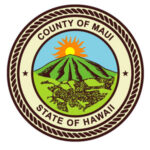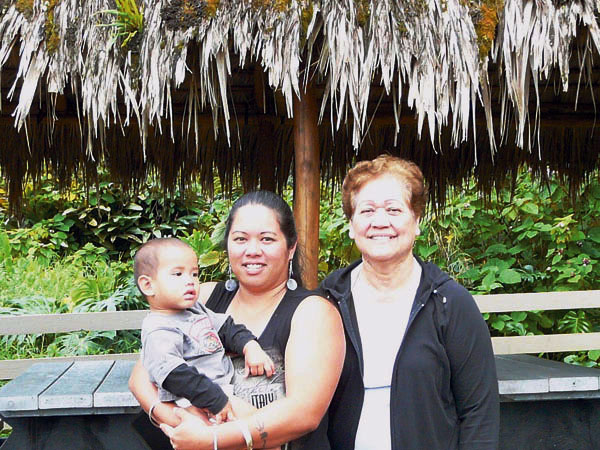
Aug 7, 2013 | Education

“We want to be ready when the community is ready for a charter school.” — Sommer “Kehau” Kimokeo, Keanae parent
Keanae mom Sommer “Kehau” Kimokeo says she and the nonprofit she founded aren’t giving up on a dream to build a charter school in their remote East Maui community. Ka Waianu o Haloa’s application to open a charter school for children living in East Maui is currently on hold at the state Department of Education, Kimokeo said. “We believe there’s still a need for a charter school,” said Kimokeo, the president and founder of Ka Waianu o Haloa. She’s also the mother of three children, ages 11, 10 and 4.
Ka Waianu o Haloa’s members include parents and grandparents of Keanae and Waialua schoolchildren who endure a one-hour bus ride on the narrow and winding Hana Highway to attend Hana High and Elementary School. The nonprofit’s name refers to the cold water of Haloa, a source that helps the community grow and prosper. Keanae School was officially closed by the state Board of Education the same year Ka Waianu o Haloa formed and entered into a lease agreement to use the campus facilities to run health programs and community activities for all ages. “Our goal ultimately is to open a charter school on the campus,” Kimokeo said. “Right now we’re focusing our energy on educational programs for families.” Kimokeo said there are 24 school-aged children in her community who could attend the charter school if it opened today.
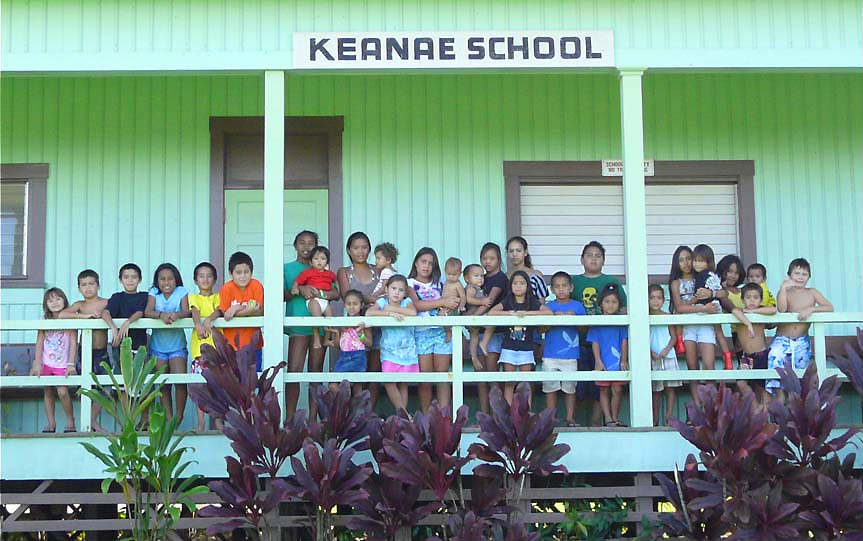 Kimokeo said approximately 1,000 people attended the group’s fundraiser in July on the school grounds. “It was nice. A lot of people showed up and supported us,” she said. With the new school year opening, Kimokeo said she’s preparing to start up another round of educational weekend programs that offer lessons in fishing, coconut palm weaving and kapa making. “We’re still pursuing all the educational aspects of our nonprofit,” she said. For more information, contact Kimokeo at 248-7403; or visit keanaecharterschool.org.
Kimokeo said approximately 1,000 people attended the group’s fundraiser in July on the school grounds. “It was nice. A lot of people showed up and supported us,” she said. With the new school year opening, Kimokeo said she’s preparing to start up another round of educational weekend programs that offer lessons in fishing, coconut palm weaving and kapa making. “We’re still pursuing all the educational aspects of our nonprofit,” she said. For more information, contact Kimokeo at 248-7403; or visit keanaecharterschool.org.
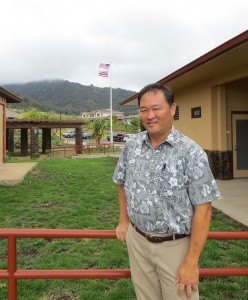
Jul 31, 2013 | Education

“I want Pu`u Kukui Elementary to be known as a school with heart.” — Principal Chad Okamoto
Maui’s newest public elementary school opens Aug. 5 in Wailuku with a staff of 28 teachers ready to work with 550 students in kindergarten through 5th grade. Principal Chad Okamoto, a 20-year veteran of the state Department of Education, has been working on building a staff that will work like a family. “I looked for heart,” Okamoto said in explaining his hiring process. “I wanted people who care about people and want to help people reach their potential.” Faculty experience ranges from a first-year college graduate to an educator with 42 years of teaching experience. “We’ll be focusing on the positive and building on their strengths,” Okamoto said.
Pu`u Kukui Elementary is located on 14 acres mauka of the Ohia Subdivision on property provided by Kehalani Mauka LLC. The campus has eight buildings featuring air-conditioned classrooms, space for special education students, a large dining facility, multiple faculty meeting rooms, administrative offices, a covered basketball court and a playing field that overlooks the central valley. Built to ease overcrowding in Central Maui’s public schools, Pu`u Kukui enrolled 200 students from nearby Wailuku Elementary and approximately 100 students from Pomaika`i Elementary in Kahului. Okamoto decided to adopt a teaching philosophy based on STEAM, which stands for Science and Technology interpreted through Engineering and the Arts all based in Mathematical elements. He and his staff have also been approaching their work based on teachings from Stephen R. Covey’s “The Seven Habits of Highly Effective People.”
Okamoto said what’s important to him is that students at his school learn the importance of caring for one another. He’s insisted that each classroom incorporate a community service project into its lessons. “I see us as an integral part of the community and I think the kids need to know they need to give back,” Okamoto said. “I want Pu`u Kukui Elementary to be known as a school with heart.”
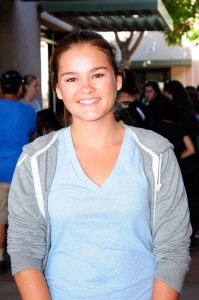
Jul 17, 2013 | Education

“Tech Connect gives us a lot of ideas about a future in science. We learn there’s no limit to what we can learn and do.” — Olivia Takakura, Wailuku Roselani Na Hokulani 4-H Club
Nearly 60 girls in 4-H clubs across the island danced under the stars and used GPS navigation techniques to find treasures at the annual 4-H Tech Connect* Fair held at Maui Economic Development Board. Designed to promote careers in science, technology, engineering and math, Tech Connect offered a variety of activities from “Spaghetti Bridge” to “Float the Boat,” challenging participants to test their skills in math and science. “It’s always a lot of fun,” said Olivia Takakura, a 13-year-old in the Wailuku Roselani Na Hokulani 4-H Club. She and her club members coordinated with other clubs across the island to attend MEDB’s event, funded this year by a grant from the U.S. Department of Education.
Takakura said her experiences at Tech Connect and at the FIRST Lego League robotic competition has fueled her interest in science and math. “I’m thinking about medical school or energy resources in my future. I had not thought about it until after I saw all these opportunities,” she said. Kaitlyn Yamada, also a Wailuku Roselani 4-H member, said she’s learned to use compasses, telescopes and a GPS – all through Tech Connect. “We really like GPS. You know it’s not just for cars. We can use GPS to find all kinds of things,” she said. At Tech Connect, Yamada helped to set up the coordinates of buried “treasure” on MEDB property. “GPS is really easy to me to use and it’s a lot of fun,” Yamada said.
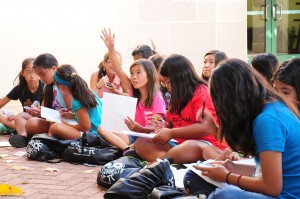 This year’s Tech Connect opened with a presentation by Kawai Kulihiwa, an astronomer and former MEDB intern and participant in the MEDB Women in Technology Project. “I looked in the sky and I loved it,” she told the group of 4-H girls. Kulihiwa provided background about Polynesian voyages to Hawaii and encouraged the young girls to learn as much as they could about science and math. “If you work hard, it’ll pay off,” she said.
This year’s Tech Connect opened with a presentation by Kawai Kulihiwa, an astronomer and former MEDB intern and participant in the MEDB Women in Technology Project. “I looked in the sky and I loved it,” she told the group of 4-H girls. Kulihiwa provided background about Polynesian voyages to Hawaii and encouraged the young girls to learn as much as they could about science and math. “If you work hard, it’ll pay off,” she said.
* MEDB’s 4-H Tech Connect was launched in 2006 by MEDB’s Women in Technology Project with funding from U.S. Department of Agriculture.
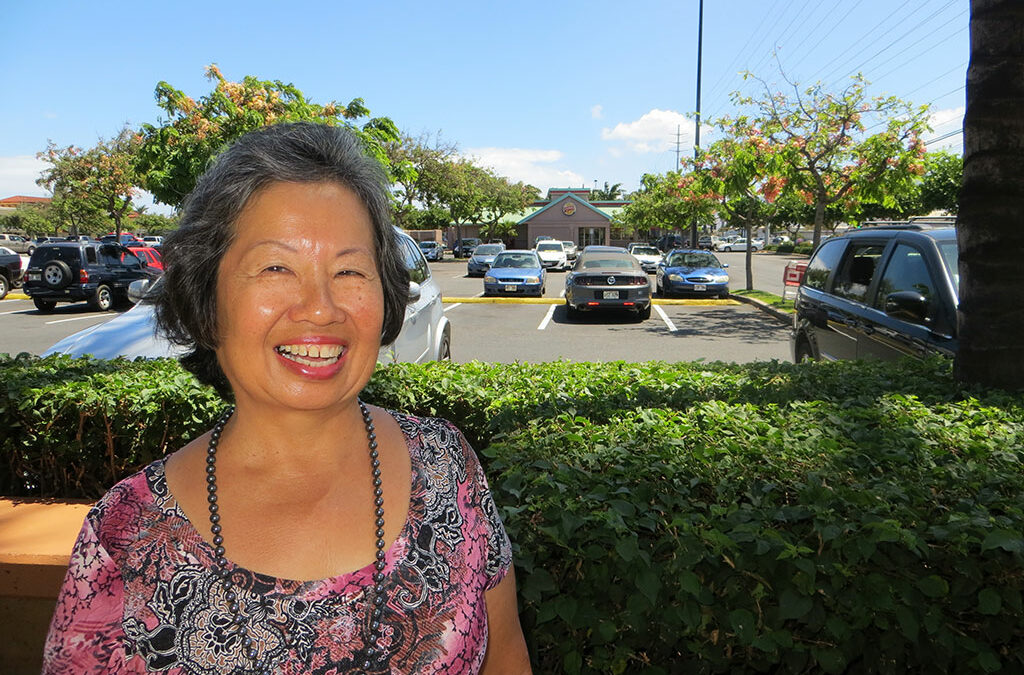
Jul 16, 2013 | Education
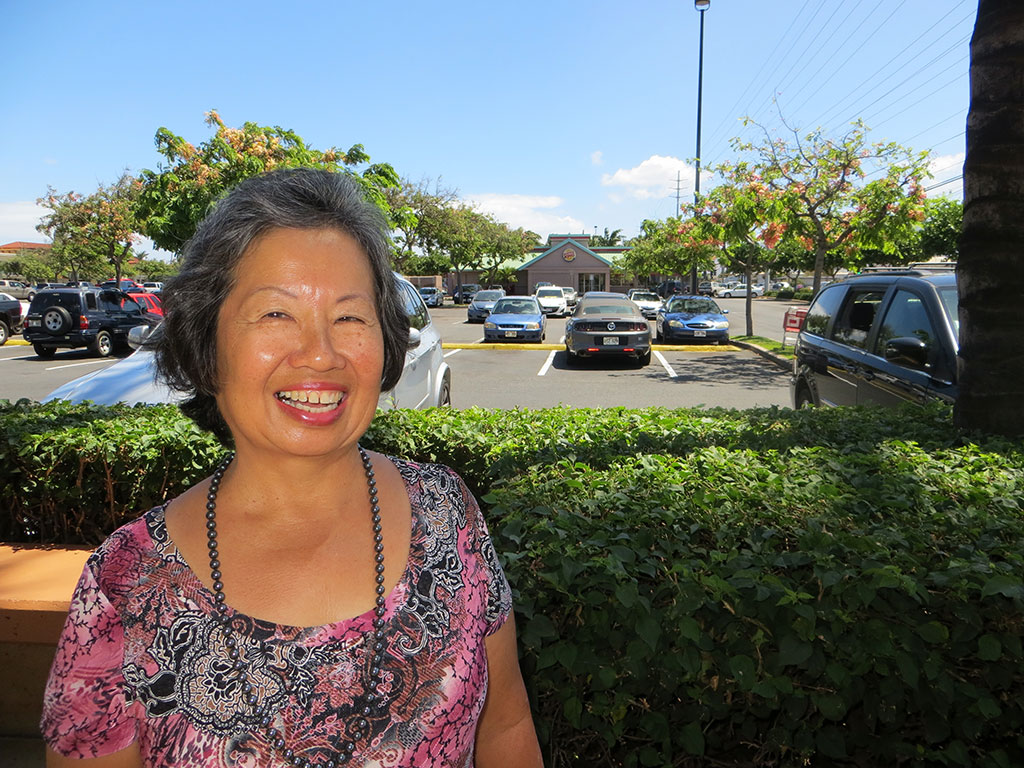
“Math is something you don’t want to rush. You need to learn it step by step, and you have to teach it step by step.” — Ann Arakawa, retired Assistant Math Professor
In her 30-year career as a college math teacher, Ann Arakawa found that students who overcame feeling intimidated by math became successful. “There’s a lot of fear and anxiety out there about math,” said Arakawa, the wife of Mayor Alan Arakawa. “Once they get over the fear, they usually do fine.” Now retired, Mrs. Arakawa spends her time overseeing the family budget and volunteering with the accounting of her husband’s campaign finances. “I love math, and I’m pretty good at it. I also enjoyed teaching math tremendously.”
Asked what advice she would give math teachers, Arakawa encouraged grade-level educators to be patient and engaging. “With the young ones, you need to find a way to make math fun,” she said. “Math is something you don’t need to rush. You need to learn it step by step, and you have to teach it step by step.” She said her college students often expressed regret about not taking math seriously in high school. Many of them expressed interests in a future in computer science and technology but without math skills, they couldn’t move forward. “I tell them half the battle is the motivation and the desire,” she said, “after that you pretty much can accomplish whatever you want.” Arakawa said she’s especially keen on educational initiatives that promote grade and high school science, technology, engineering and math.
Ann Arakawa and her husband, Mayor Alan Arakawa, will be hosting “Are You Smarter than a STEM 5th Grader?” a fun and engaging contest for attendees during the annual Maui Economic Development Board Ke Alahele Education Fund Dinner & Auction on Saturday, Aug. 24 at the Grand Wailea Resort. “I think it’s so important for us to support our youth and the future of our community,” Arakawa said. For more information about the Ke Alahele fundraiser, call MEDB at 875-2300, or visit: medb.org/KeAlahele/overview.cfm
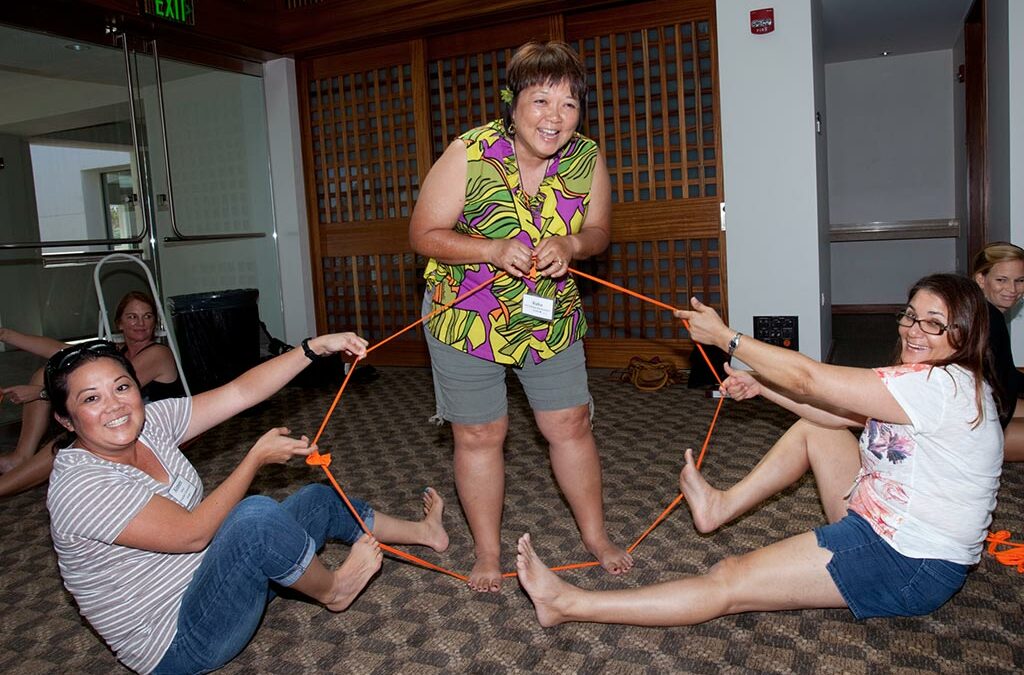
Jul 3, 2013 | Education
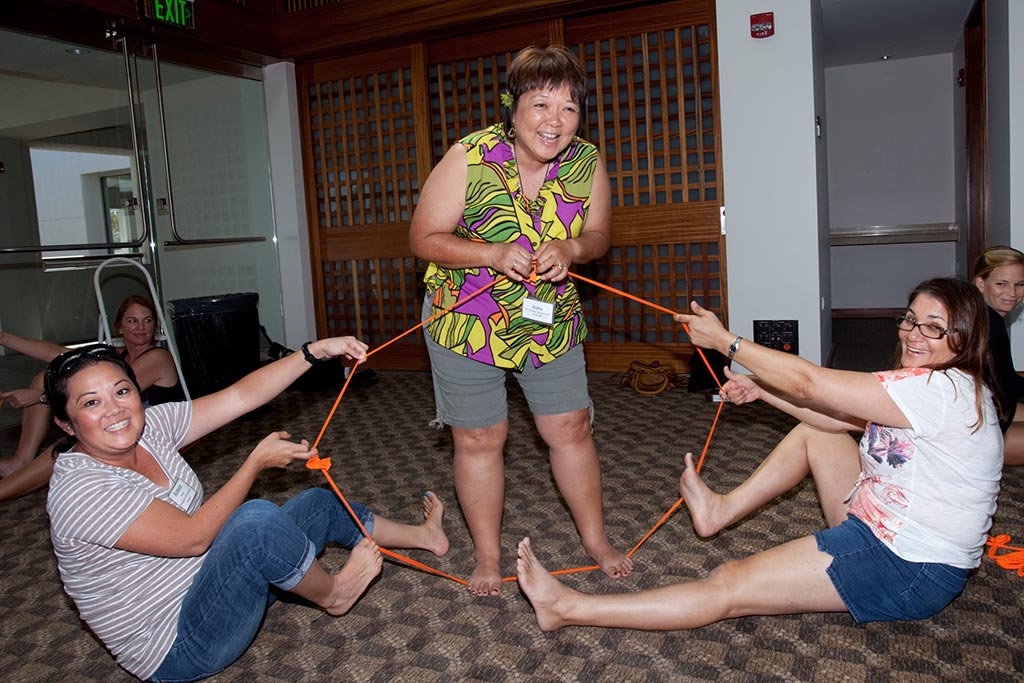 Whether you break out in song, tap toes, snap fingers or hum that tune you can’t seem to get out of your head, music is part of our lives — but can it teach children to add, subtract, multiply and divide? Yes, according to Marcia Daft, the founder and artistic director of “Moving through Math.” At the onset of the summer, Daft shared her theories and offered tips to Maui teachers during the 2013 Summer Institute for Educators at the Maui Arts & Cultural Center. “I found that they are actively seeking and wanting to master innovative teaching techniques that are consistent with the way children actually learn,” Daft said about the institute participants. “Teachers are clearly not afraid to try out new strategies and work to master them.”
Whether you break out in song, tap toes, snap fingers or hum that tune you can’t seem to get out of your head, music is part of our lives — but can it teach children to add, subtract, multiply and divide? Yes, according to Marcia Daft, the founder and artistic director of “Moving through Math.” At the onset of the summer, Daft shared her theories and offered tips to Maui teachers during the 2013 Summer Institute for Educators at the Maui Arts & Cultural Center. “I found that they are actively seeking and wanting to master innovative teaching techniques that are consistent with the way children actually learn,” Daft said about the institute participants. “Teachers are clearly not afraid to try out new strategies and work to master them.”
MACC Education Director Susana Browne said this was the first year the summer institute tackled integrating math with the arts. In two separate weeks, MACC accommodated approximately 64 educators who teach pre-K to 6th grade. “Teachers were very responsive to this new approach on teaching math fundamentals by delving deep into repeating patterns,” Browne said. “They saw that movement and music are also based on repeating patterns.”
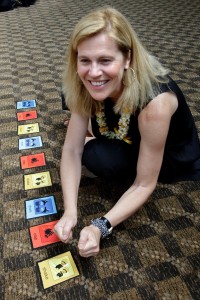 The teachers said they would incorporate music into their math lesson plans. “The lesson plans helped us to teach for understanding and comprehension – not just memorization,” an early-learning resource teacher said. Another teacher, who has a classroom of 1st graders, said: “The information provided in this workshop is totally going to change how I teach math to my students.” The teachers will take their music-math lessons into their classrooms this fall and then evaluate the impact on students’ understanding and application of math concepts. Daft is a national workshop presenter for the John F. Kennedy Center for the Performing Arts in Washington, D.C. She has presented Maui summer institutes on three occasions and is scheduled to return in September for a follow-up workshop.
The teachers said they would incorporate music into their math lesson plans. “The lesson plans helped us to teach for understanding and comprehension – not just memorization,” an early-learning resource teacher said. Another teacher, who has a classroom of 1st graders, said: “The information provided in this workshop is totally going to change how I teach math to my students.” The teachers will take their music-math lessons into their classrooms this fall and then evaluate the impact on students’ understanding and application of math concepts. Daft is a national workshop presenter for the John F. Kennedy Center for the Performing Arts in Washington, D.C. She has presented Maui summer institutes on three occasions and is scheduled to return in September for a follow-up workshop.
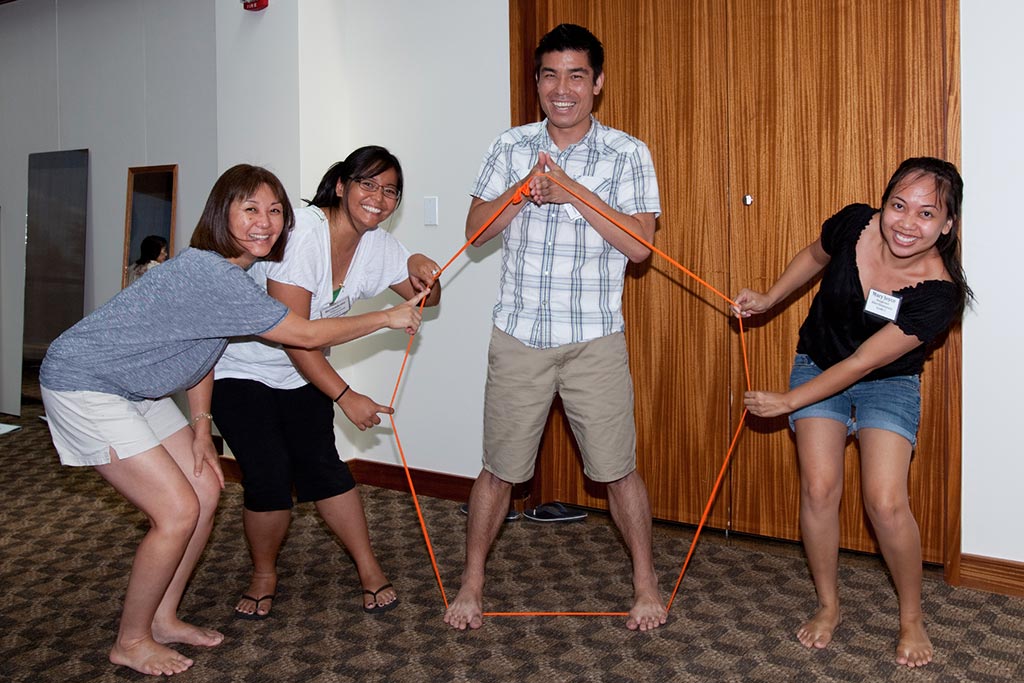
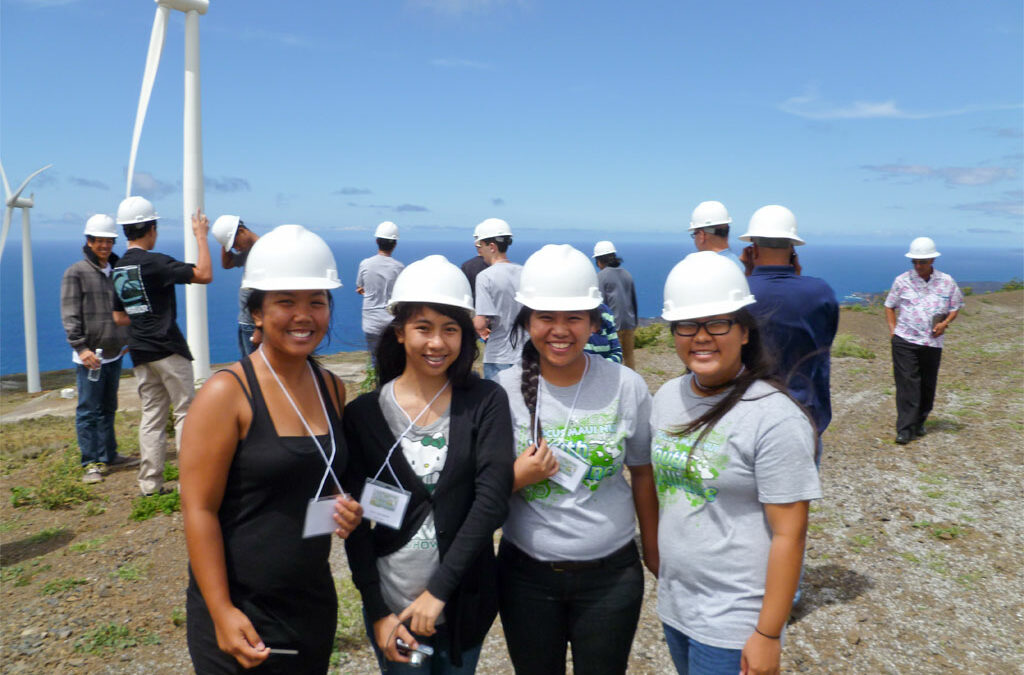
Jun 12, 2013 | Education
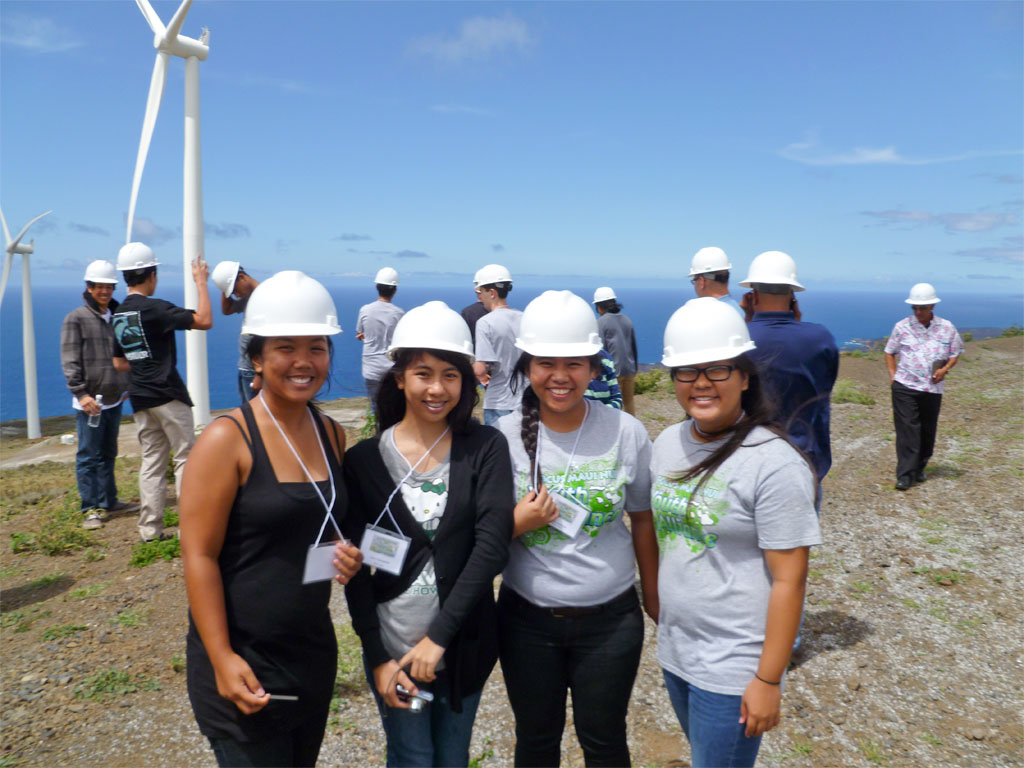 Youth Alliance members solidified their support for renewable energy systems after touring the Auwahi Wind facility in Ulupalakua. “I had not realized the importance of windmills on our islands and how much they truly contribute to our lives,” 11th-grader Racieli Andrada said after visiting the wind farm. “We are very lucky to to have access to a variety of energy resources,” she said, “and we should use it while we have it rather than wasting lots of money on importing oil and what not.” Graduated senior Lavinia Sagario added: “Wind farms fit perfectly in the overall energy systems for Maui County.”
Youth Alliance members solidified their support for renewable energy systems after touring the Auwahi Wind facility in Ulupalakua. “I had not realized the importance of windmills on our islands and how much they truly contribute to our lives,” 11th-grader Racieli Andrada said after visiting the wind farm. “We are very lucky to to have access to a variety of energy resources,” she said, “and we should use it while we have it rather than wasting lots of money on importing oil and what not.” Graduated senior Lavinia Sagario added: “Wind farms fit perfectly in the overall energy systems for Maui County.”
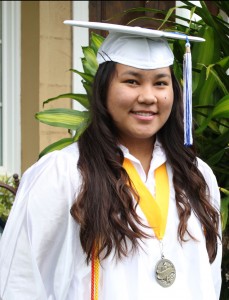
Auwahi Wind Energy’s 21-megawatt wind farm features eight turbines on Haleakala’s wind-rich southeast slope on Ulupalakua Ranch land. The project was officially dedicated in February and is expected to generate enough electricity to power 10,000 homes on Maui. The project, developed by Sempra U.S. Gas and Power and BP Energy, is poised to help Hawaii reach its goal of reducing its dependence on fossil fuels and help the state reach its goal of securing 40 percent of its energy from renewable sources by 2030. Sagario said she learned on the tour that wind energy contributes approximately nine percent of the power provided by Maui Electric Co. “At least that nine percent is something cleaner than oil,” she said.
Youth Alliance members attend monthly events during the school year to explore and gain a greater understanding of key components in the Maui community. Their gatherings are coordinated by the Maui Economic Development Board. “Education is important to learn the background information and technicality of renewable energy, but so is experience,” Sagario said. Andrada and Sagario said visiting the wind farm made them keenly aware of the importance of education and training in renewable energy. “As the renewable energy field takes off, this will only provide more jobs and improve our economy and environment,” Andrada said.
Jun 5, 2013 | Education

Alisha Summers
Now that they’ve graduated, high school seniors Jared Sam Agtunong and Alisha Summers agreed to offer advice to the Class of 2014. Summers encouraged seniors to enjoy their final year by working hard yet not overloading their schedules. “This is the year that you want to enjoy,” she said. “I also advise the next class to start applying to college early because you do not want to miss any precious opportunities because you procrastinated on applications.” She said she believes she’s grown more confident through her K-12 education and that it’s prepared her for what’s next. “Hopefully all that I have learned will be useful for the future because I know that change can be exciting yet intimidating.”

Jared Sam Agtunong
“My advice to the next high school seniors is to remember who you are and focus on your goals and passion,” Agtunong said. As a senior, he engaged in student government roles and in Youth Alliance, a community engagement project coordinated by Maui Economic Development Board. “I was so glad I got involved because that’s how I truly found my passion. I learned I want to serve my community,” he said. Agtunong will attend Vanguard University in Costa Mesa, California, and major in political science and international relations. “All my years of schooling taught me to be a service leader so that’s what I want to do in life,” he said, adding that he would like to eventually return to Maui.
Summers will enroll at the University of Hawaii at Manoa where she’ll pursue environmental studies. She hopes to travel and study abroad. “I love Maui and I find it a relaxing and beautiful place to live. After I explore, I would consider coming back and giving back to Maui’s community.” Agtunong and Summers agreed that family and teachers contributed to their high school success. “That’s why I’d tell seniors, ask for help when needed,” he said. “There are people ready to help you and want to help but you have to ask for it.”
Jun 3, 2013 | Education

Kawika Gonzales, Kaunakakai Elementary School teacher
“As an educator, it makes my job easier when I have the right tools to expand our students’ learning.”
Molokai teacher Kawika Gonzales appreciates the support his students have received through the Maui Economic Development Board Ke Alahele Education Fund. Online reservations for the 2013 Ke Alahele dinner and auction on Aug. 24 are now being accepted.
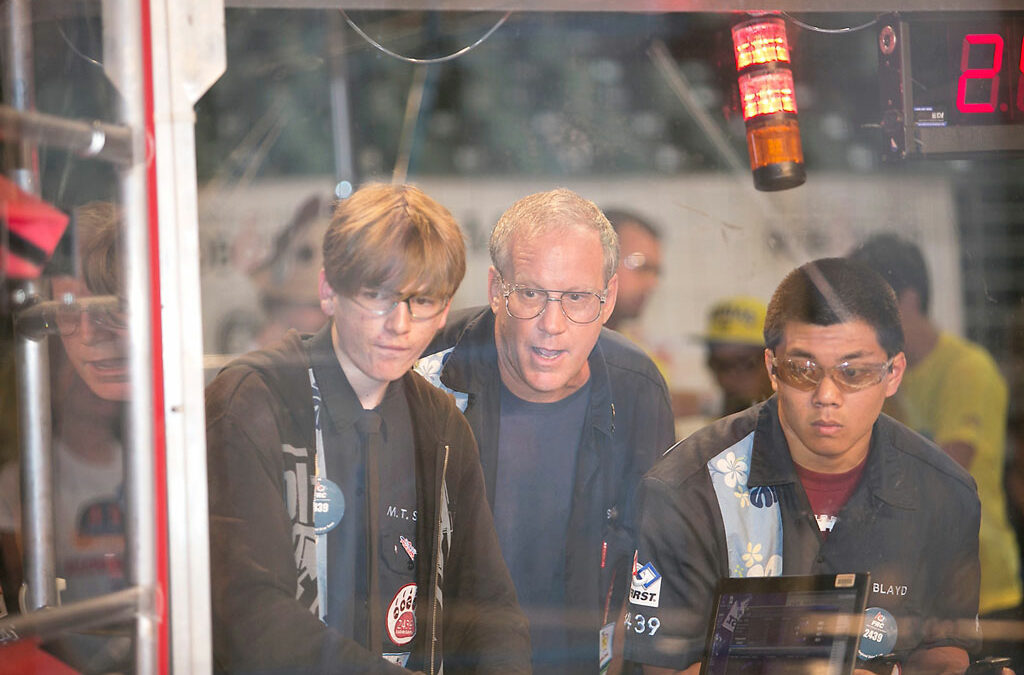
May 22, 2013 | Education, Innovation
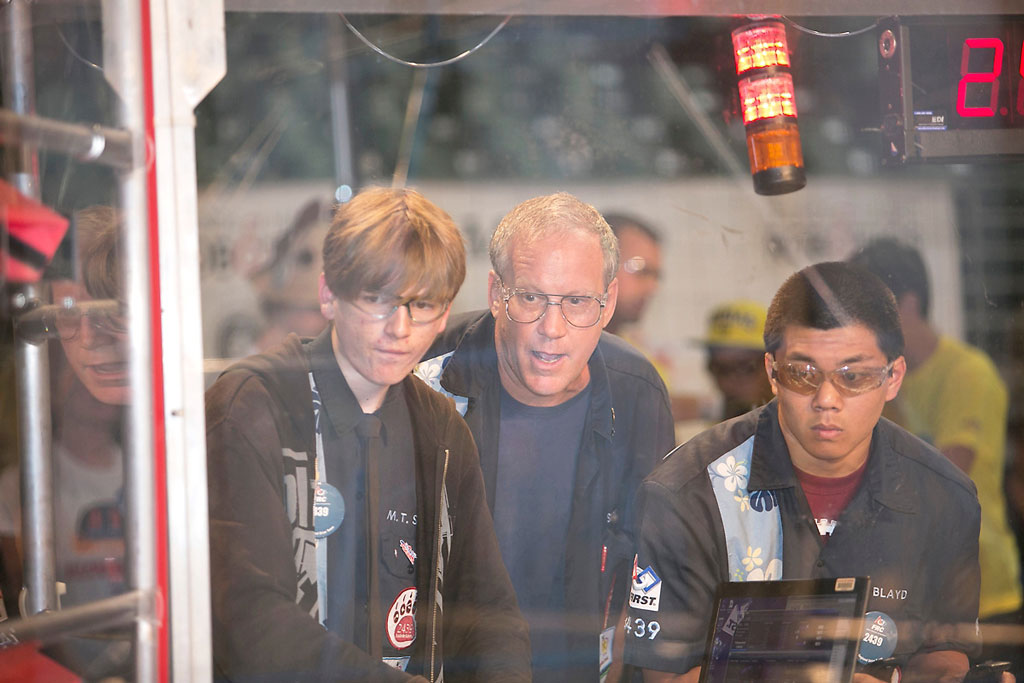 Baldwin High School Robotics Club members achieved their best season in six years, through hard work and community support, according to adviser Gary Suter. “We have a lot to improve on, but we learned that we can hold our own at the national level,” Suter said. As Hawaii’s representative to the FIRST Robotics Competition held in St. Louis, Mo., Baldwin was seeded 12th out of 100 teams in its pool, a spot that took them to the verge of competing at the highest national level.
Baldwin High School Robotics Club members achieved their best season in six years, through hard work and community support, according to adviser Gary Suter. “We have a lot to improve on, but we learned that we can hold our own at the national level,” Suter said. As Hawaii’s representative to the FIRST Robotics Competition held in St. Louis, Mo., Baldwin was seeded 12th out of 100 teams in its pool, a spot that took them to the verge of competing at the highest national level.
Competitors in FIRST Robotics were given six weeks to design, build and program robots that weigh up to 120 pounds. The robots perform various tasks to earn points. In this year’s game, robots scored points for shooting Frisbees in or on various goals. They climbed rungs on a pyramid-shaped structure. Suter served as the adviser for Baldwin’s 22-member club. Eight students traveled to compete in the national contest. Senior Software Engineer Bob Brem of Boeing Company assisted with mentoring the students. Looking ahead to the 2014 contest, Suter said his students could use the expertise of a mechanical engineer as well.
Suter said he’s grateful to have Brem and Boeing, for their support, as well as Maui Economic Development Board, which helped make up a cash shortfall for team travel expenses. Family, friends and other individuals chipped in as well. “The community really stepped up for us. We could not have competed nationally without support,” Suter said. “MEDB made a huge difference.” MEDB provided more than $5,000 in support from the Ke Alahele Education Fund. Suter said the purpose of competing in robotics is to promote and advance high-technology skills. “The students get to apply science, math and engineering in robotics. It’s a real pressure cooker, but it’s also a very, very real world experience for them,” he said.


 Kimokeo said approximately 1,000 people attended the group’s fundraiser in July on the school grounds. “It was nice. A lot of people showed up and supported us,” she said. With the new school year opening, Kimokeo said she’s preparing to start up another round of educational weekend programs that offer lessons in fishing, coconut palm weaving and kapa making. “We’re still pursuing all the educational aspects of our nonprofit,” she said. For more information, contact Kimokeo at 248-7403; or visit keanaecharterschool.org.
Kimokeo said approximately 1,000 people attended the group’s fundraiser in July on the school grounds. “It was nice. A lot of people showed up and supported us,” she said. With the new school year opening, Kimokeo said she’s preparing to start up another round of educational weekend programs that offer lessons in fishing, coconut palm weaving and kapa making. “We’re still pursuing all the educational aspects of our nonprofit,” she said. For more information, contact Kimokeo at 248-7403; or visit keanaecharterschool.org.

 This year’s Tech Connect opened with a presentation by Kawai Kulihiwa, an astronomer and former MEDB intern and participant in the
This year’s Tech Connect opened with a presentation by Kawai Kulihiwa, an astronomer and former MEDB intern and participant in the 


 Whether you break out in song, tap toes, snap fingers or hum that tune you can’t seem to get out of your head, music is part of our lives — but can it teach children to add, subtract, multiply and divide? Yes, according to Marcia Daft, the founder and artistic director of “Moving through Math.” At the onset of the summer, Daft shared her theories and offered tips to Maui teachers during the 2013 Summer Institute for Educators at the Maui Arts & Cultural Center. “I found that they are actively seeking and wanting to master innovative teaching techniques that are consistent with the way children actually learn,” Daft said about the institute participants. “Teachers are clearly not afraid to try out new strategies and work to master them.”
Whether you break out in song, tap toes, snap fingers or hum that tune you can’t seem to get out of your head, music is part of our lives — but can it teach children to add, subtract, multiply and divide? Yes, according to Marcia Daft, the founder and artistic director of “Moving through Math.” At the onset of the summer, Daft shared her theories and offered tips to Maui teachers during the 2013 Summer Institute for Educators at the Maui Arts & Cultural Center. “I found that they are actively seeking and wanting to master innovative teaching techniques that are consistent with the way children actually learn,” Daft said about the institute participants. “Teachers are clearly not afraid to try out new strategies and work to master them.” The teachers said they would incorporate music into their math lesson plans. “The lesson plans helped us to teach for understanding and comprehension – not just memorization,” an early-learning resource teacher said. Another teacher, who has a classroom of 1st graders, said: “The information provided in this workshop is totally going to change how I teach math to my students.” The teachers will take their music-math lessons into their classrooms this fall and then evaluate the impact on students’ understanding and application of math concepts. Daft is a national workshop presenter for the John F. Kennedy Center for the Performing Arts in Washington, D.C. She has presented Maui summer institutes on three occasions and is scheduled to return in September for a follow-up workshop.
The teachers said they would incorporate music into their math lesson plans. “The lesson plans helped us to teach for understanding and comprehension – not just memorization,” an early-learning resource teacher said. Another teacher, who has a classroom of 1st graders, said: “The information provided in this workshop is totally going to change how I teach math to my students.” The teachers will take their music-math lessons into their classrooms this fall and then evaluate the impact on students’ understanding and application of math concepts. Daft is a national workshop presenter for the John F. Kennedy Center for the Performing Arts in Washington, D.C. She has presented Maui summer institutes on three occasions and is scheduled to return in September for a follow-up workshop.

 Youth Alliance members solidified their support for renewable energy systems after touring the Auwahi Wind facility in Ulupalakua. “I had not realized the importance of windmills on our islands and how much they truly contribute to our lives,” 11th-grader Racieli Andrada said after visiting the wind farm. “We are very lucky to to have access to a variety of energy resources,” she said, “and we should use it while we have it rather than wasting lots of money on importing oil and what not.” Graduated senior Lavinia Sagario added: “Wind farms fit perfectly in the overall energy systems for Maui County.”
Youth Alliance members solidified their support for renewable energy systems after touring the Auwahi Wind facility in Ulupalakua. “I had not realized the importance of windmills on our islands and how much they truly contribute to our lives,” 11th-grader Racieli Andrada said after visiting the wind farm. “We are very lucky to to have access to a variety of energy resources,” she said, “and we should use it while we have it rather than wasting lots of money on importing oil and what not.” Graduated senior Lavinia Sagario added: “Wind farms fit perfectly in the overall energy systems for Maui County.”




 Baldwin High School Robotics Club members achieved their best season in six years, through hard work and community support, according to adviser Gary Suter. “We have a lot to improve on, but we learned that we can hold our own at the national level,” Suter said. As Hawaii’s representative to the FIRST Robotics Competition held in St. Louis, Mo., Baldwin was seeded 12th out of 100 teams in its pool, a spot that took them to the verge of competing at the highest national level.
Baldwin High School Robotics Club members achieved their best season in six years, through hard work and community support, according to adviser Gary Suter. “We have a lot to improve on, but we learned that we can hold our own at the national level,” Suter said. As Hawaii’s representative to the FIRST Robotics Competition held in St. Louis, Mo., Baldwin was seeded 12th out of 100 teams in its pool, a spot that took them to the verge of competing at the highest national level.